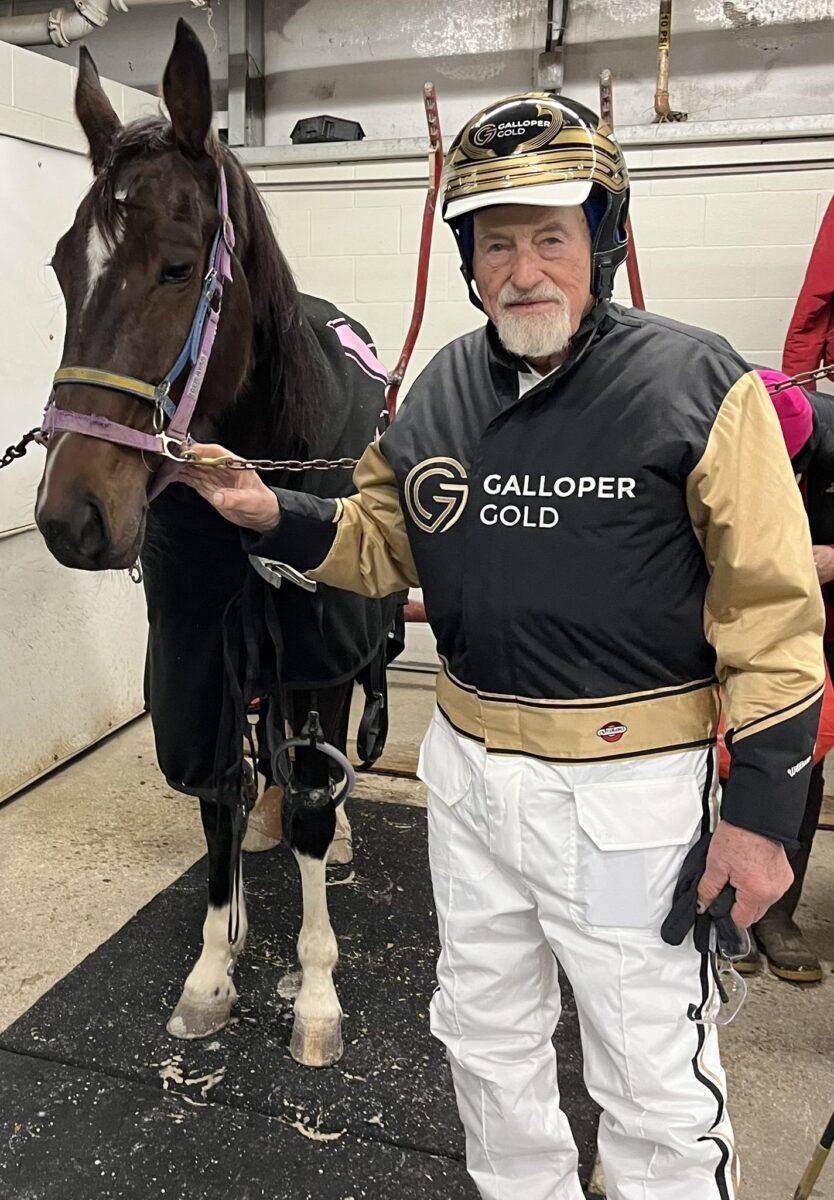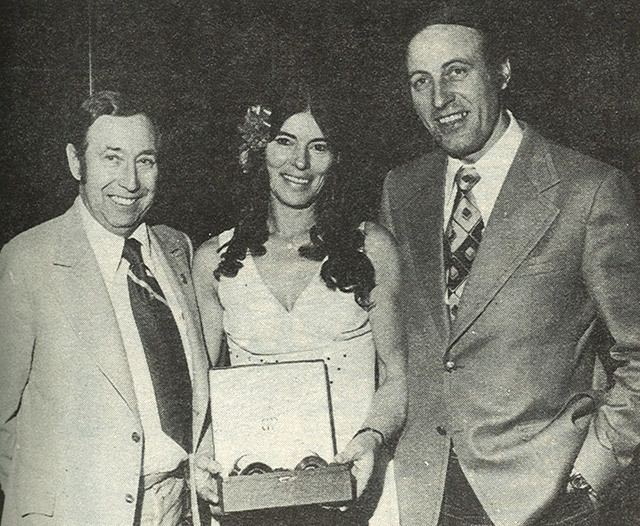Winning never gets old for 91-year-old Bill Megens
The nonagenarian still breeds, trains, and, sometimes, drives his own.
by Matthew Lomon
Steering a near 1,000-pound racehorse from a suspended position through frigid temperatures isn’t how most 91-year-olds spend their evenings, but as you might have already guessed, Bill Megens is not your typical nonagenarian.
The incomparable Guelph, ON-based horseman made headlines on Dec. 20 when he piloted his homebred trotter Willy Strike to victory in race 6 at The Raceway at Western Fair District.
Leaving from post 5, the son of Alarm Detector—Market Strike got away second through the opening quarter, maintaining his position at the half. The pair was still second but on the move at three-quarters, and at the stretch call remained a length-and-a-half behind the leader, even-money favorite HA Code Red.
A valiant final push ultimately proved proper for Megens and the bay gelding, 88 years his junior. They crossed the finish line in 2:06 for a quarter-length triumph.
As the 4-1 third choice, Willy Strike paid $10.60.
“He might not be the fastest but he’s a really nice horse,” said Megens. “He’s got four white legs, and a lot of people like him. I thought he might be in a little tough, but he got lucky, and we won.
“That’s driving… keep turning to the left.”
An eye-catching horse and an ordinary philosophy earned Megens his first trip to the winner’s circle since Oct. 12, 2021, and his 1,190th across some 5,800 lifetime starts.
But the head-turning score, which occurred in his 21st start of 2024, came as somewhat of a surprise to Megens.
It wasn’t because he didn’t have faith in his plucky youngster. Instead, he envisioned getting across the finish line first with another one of his homebreds, He Will.
“I thought I could win with my other horse [He Will],” said Megens, who drove the 4-year-old son of Muscle Mass—Juliet later that night in race 11.
An encouraging string of training sessions had Megens convinced the bay trotter was ready for a return to the oval following a series of difficult stretches that required prolonged shutdowns.
However, the effective workouts didn’t translate for He Will, who after a strong start faltered to eighth of eight.
Despite the unfortunate nightcap, Megens stood as the talk of the town around Western Fair.
“It’s truly remarkable to watch Bill come to the track and do his thing,” said Greg Blanchard, director of equine programming at Western Fair. “I think everyone gets some motivation from seeing a guy like him still getting to do what he loves. He is such a well-liked guy, and I think everyone is enjoying this ride along with him.
“It’s something we may never see again.”
Perhaps not, but betting against William John Megens, Jr. wouldn’t be a wise allocation of funds.
The extraordinary feat was merely the latest chapter in a long list of storybook moments that transcend far beyond traditional wins and losses.
Megens’ story traces back to 1950, the year he and his brother John moved to Canada from The Netherlands.
Just 16-years-old at the time, Bill got his start in the horse racing industry at his father’s northern Ontario farm.
While he knew at a young age that working with horses was what he was meant to do, the bright-eyed teenager spent the following years building a resume as diverse as they come.
“I worked on the farm, and then in the winter time, my father sent us down to Toronto to make a little extra money to help the family out,” said Bill. “I worked in a furniture store, did a bit of construction, and then I went back to the farm.”
In the fall of ’51, Bill’s brother John got a job on a construction site making around $40 per week. During that same time, Bill was making $30 per week working at the now defunct Dufferin Park.
Both Megens boys would send $100 home at the end of each month. This left Bill with a net monthly income of around $20, or less than $1 a day.
But he was doing what he loved working with the horses at Dufferin Park, and it paid enough to buy milk and Rice Krispies.
After a few more stints between the family farm and Dufferin Park, Bill’s racing career took him to Blue Bonnets in Montreal and Thorncliffe Park in Toronto.
He even matched John in making $40 a week.
Despite all that, Bill made the decision to step away from the horse racing industry. He didn’t foresee a sustainable future in the game, especially with night racing being a foreign concept at that time.
“I quit the horses and did, you name it,” said Bill. “I went into the landscaping business, then I had a butcher shop in Orillia for a while, and I sold that. Then I ended up with a dairy farm. I milked 40-some-odd cows up in Beaverton [ON].”
His next stop did not involve another career change, but instead, a career revival.
A timely visit from his brother-in-law, who himself was a horse racing fan, was all it took for Bill to give his true passion a second shot at Greenwood Raceway in Toronto.
“Night racing, purses were a little better, and I ended up selling my dairy farm and my cows and everything else,” said Bill. “I got a few horses and headed down to Toronto. That’s how I got back in.
“I had one owner that bought a couple of horses, and that helped. After that, I tried to make a living.”
By that time, Bill and his wife Antionette had seven children, and he felt racing only at Garden City Raceway in St. Catherines wasn’t going to cut it.
After persevering through a few bouts of bad luck, Bill got his break with champion trotter Snegem Flight.
Bill coined the ‘Snegem’ moniker, his last name spelled backwards, as a way of making sure the names he chose weren’t already taken.
“I got really lucky with him,” said Bill. “The [Ontario] Sire Stakes just started that year [1974] when he was a 2-year-old. He was 2-Year-Old Trotter of the Year and 3-Year-Old Trotter of the Year. As a 3-year-old, I represented Canada in the [Roosevelt] International at Yonkers with him.”
The enduring horseman’s streak of good fortune continued with a yearling he renamed Snegem Telstar.
With Bill at the helm, Snegem Flight dead-heated with juggernaut Noble Art in a 1977 Grand Circuit tilt at Blue Bonnets to set a track and Canadian record time of 2:04.
“We got really lucky,” said Bill. “They all said I got an angel looking after me.”
Over the course of his decorated career, Bill received several accolades from the Ontario Jockey Club for his driving and training accomplishments.
Most importantly, he’s doing it his way.
“It’s a different game today,” said Bill. “People are buying yearlings for $800,000 and stuff like that. I’m just doing it the old way. I raise my own, train my own, and sometimes drive my own. But that’s people like me, a thing of the past, unless you have a good job beside you, or some good owners to pay the bills.
“I got my own bills and my own help. I feed the horses and all that. It gets a little tough, but I think I’m doing alright for my age.”
Alright may be a severe understatement, but the modest horseman’s love for the game remains as potent as it did 75 years ago.
At age 91, Bill has no plans of calling it quits anytime soon. He learned that lesson once before.
While he does intend to shorten his stable in the spring — he currently spends 10-14 hours each day taking care of 10 horses — don’t confuse it for anything other than a simple downsizing.
“I just want to keep a few, cut down a little bit, and hopefully, have a couple half-decent horses and pay their bill,” he said. “That’s all.”
For anyone wondering if he also intends to drive the horses he keeps, Bill quickly replied, “Oh yeah.”



















